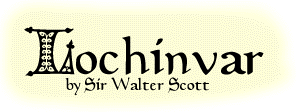
The Lay of the Last Minstrel was an immediate success
and ran into many editions. It was followed by a spate of other narrative
poems
Marmion (1808), The Lady of the Lake
(1810; the most popular),
Rokeby (1813), The Lord of
the Isles (1815), and others. The Lay shows the influence in its
rhythms of Coleridge's Christabel, but before long it settles down into
the trotting octosyllabic couplets (varied occasionally with interspersed
shorter lines rhyming with each other in ballad metre style) which represent
the norm of Scott's narrative verse. Scott wrote fast and without much
artistic conscience; so long as he could keep the rhymes and the verse
movement going he was content. He is at his best at describing settings
and sometimes in presenting fierce and rapid action; in love scenes and
with sentiment generally he is at his worst. The description of the Battle
of Flodden in Marmion has a fine heroic vigour and finely
conveys a sense of doom. But sooner or later patches of mechanical padding
are inserted to carry the verse on at all costs. The narrative is as a
rule studiedly objective, but in Marmion Scott introduced preliminary passages
of personal reminiscence. Scott also had a strangely melancholy lyric strain,
which he learned from folk literature, found in occasional incidental lyrics
introduced into the narrative poems as well as scattered throughout the
novels.
 INDEX
INDEX
This information has been extracted to
Academic year 2000/2001
British Encyclopedia, Inc.
© a.r.e.a./ Dr. Vicente Forés López
© 1973
© Sergio Clavijo Ruiz
Universidad de Valencia Press
sercla@alumni.uv.es

